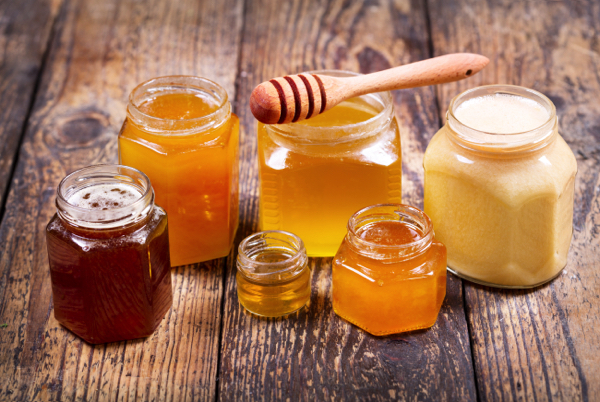 Parler
Parler Gab
Gab
- Honey has been used for millennia as a medicinal remedy and nutrient-rich food, valued in ancient Egyptian, Greek, Roman, Ayurvedic and Chinese traditions for its ability to treat wounds, infections and digestive issues. Modern science confirms its antimicrobial, anti-inflammatory and antioxidant properties.
- Unlike refined sugar, raw honey contains enzymes, antioxidants, vitamins, minerals and prebiotics, enabling this natural sweetener to support immunity, gut health and sustained energy.
- Honey can soothe coughs, fight infections, aid digestion and stabilize energy levels. However, it is high in natural sugars and should never be given to infants due to botulism risk. Avoid adulterated commercial honey.
- Opt for raw, organic honey (local or Manuka) to avoid pesticides, heavy metals and additives. Mass-produced honey often lacks nutrients and may contain harmful additives like corn syrup.
- Use honey in sweet and savory dishes – from oatmeal and golden milk tea to glazed salmon, baklava and homemade dressings – to enhance flavor while boosting health benefits.
Brief history of honey
Honey is a natural substance produced by honeybees from the nectar of flowering plants. Bees collect nectar, break it down into simple sugars and store it in honeycombs, where it ripens into the thick, golden liquid known as honey. The medicinal use of honey dates back thousands of years, with its earliest documented applications emerging in ancient Egypt (3,000 BCE). Honey was highly valued by the Egyptians as a versatile remedy, cited 500 times in the Smith Papyrus for treating wounds, sores and skin ulcers and also used for embalming and religious offerings. Ancient healers like Hippocrates also prescribed honey mixed with water and other substances to heal wounds, soothe fevers and alleviate digestive and respiratory ailments. Similarly, Ayurveda and Traditional Chinese Medicine employed honey to balance bodily energies, boost vitality and combat infections. Though honey remained only as a household staple through the ages, modern science is now reaffirming its antimicrobial, anti-inflammatory and antioxidant properties, validating what ancient civilizations have long recognized. Its role as a natural antiseptic was so trusted that various cultures, from the Assyrians to the Germans during World War I, applied honey to battlefield wounds — a tradition that persists in contemporary medical research.Nutritional profile and health benefits
Unlike refined sugar, raw unprocessed honey retains the most nutrients, while highly filtered or heated versions lose many beneficial compounds. Raw honey contains:- Enzymes (invertase, glucose oxidase) that aid digestion and support immunity.
- Antioxidants (flavonoids, phenolic acids) that combat oxidative stress.
- Vitamins and minerals like B vitamins, vitamin C, calcium, potassium, magnesium and zinc.
- Prebiotics that support gut health by feeding beneficial bacteria.
- Natural sugars (fructose, glucose) for sustained energy without blood sugar spikes (when consumed in moderation).
Importance of choosing organic honey
Not all honey is created equal. Manuka honey, while highly beneficial for medicinal use, tends to be more expensive; however, locally sourced raw honey can offer similar health benefits at a lower cost. Be wary of mass-produced, filtered "supermarket" honey, as it often contains harmful additives like antibiotics and high fructose corn syrup while lacking beneficial components. (Related: Always buy local and organic: 75 percent of high-profile honey brands contain NO honey!.) In contrast, raw, organic honey retains its natural vitamins, antioxidants and pollen content, making it a far healthier choice. Conventionally produced honey may also harbor pesticides (such as neonicotinoids and glyphosate) from contaminated pollen, heavy metals (like lead and cadmium) absorbed from polluted environments and synthetic additives used in industrial beekeeping. For optimal purity and potency, opt for organic, unfiltered honey – preferably local or Manuka for consumption and therapeutic use.Culinary uses and recipes
Honey can enhance both sweet and savory dishes. Here are some ways to incorporate honey into your meals:Breakfast and beverages
- Oatmeal drizzle – Mixed with nuts and berries.
- Golden milk turmeric tea – Paired with warm almond milk.
- Honey lemon water – A detoxifying morning ritual.
Baking and desserts
- Honey cake (Medovik) – A Russian layered dessert.
- Baklava – Phyllo pastry with honey-nut filling.
- Energy balls – Blended with dates and nuts.
Savory and sauces
- Honey-glazed salmon – Sweet and umami balance.
- Honey mustard dressing – For salads and marinades.
- Harissa-honey roasted vegetables – A Middle Eastern twist.
More related stories:
Dark "honeydew" honey contains more antioxidants than light honey.
The healing power of honey: From burns to weak bones, raw honey can help.
Seventy-five percent of honey bought at the supermarket isn't real honey.
Sources include: Brighteon.AI NaturalNews.com Brighteon.comTeff: An ancient super grain packed with nutrition and versatility
By Laura Harris // Share
Radishes are surprisingly good for you
By News Editors // Share
Strategic morning light exposure: A natural solution to combat sleep fatigue
By Willow Tohi // Share
Why Matcha Latte fans are obsessed with the ritual, not just the flavor
By HRS Editors // Share
Could antioxidants help kids with autism? Scientists are taking a closer look
By Olivia Cook // Share
Governments continue to obscure COVID-19 vaccine data amid rising concerns over excess deaths
By patricklewis // Share
Tech giant Microsoft backs EXTINCTION with its support of carbon capture programs
By ramontomeydw // Share
Germany to resume arms exports to Israel despite repeated ceasefire violations
By isabelle // Share










